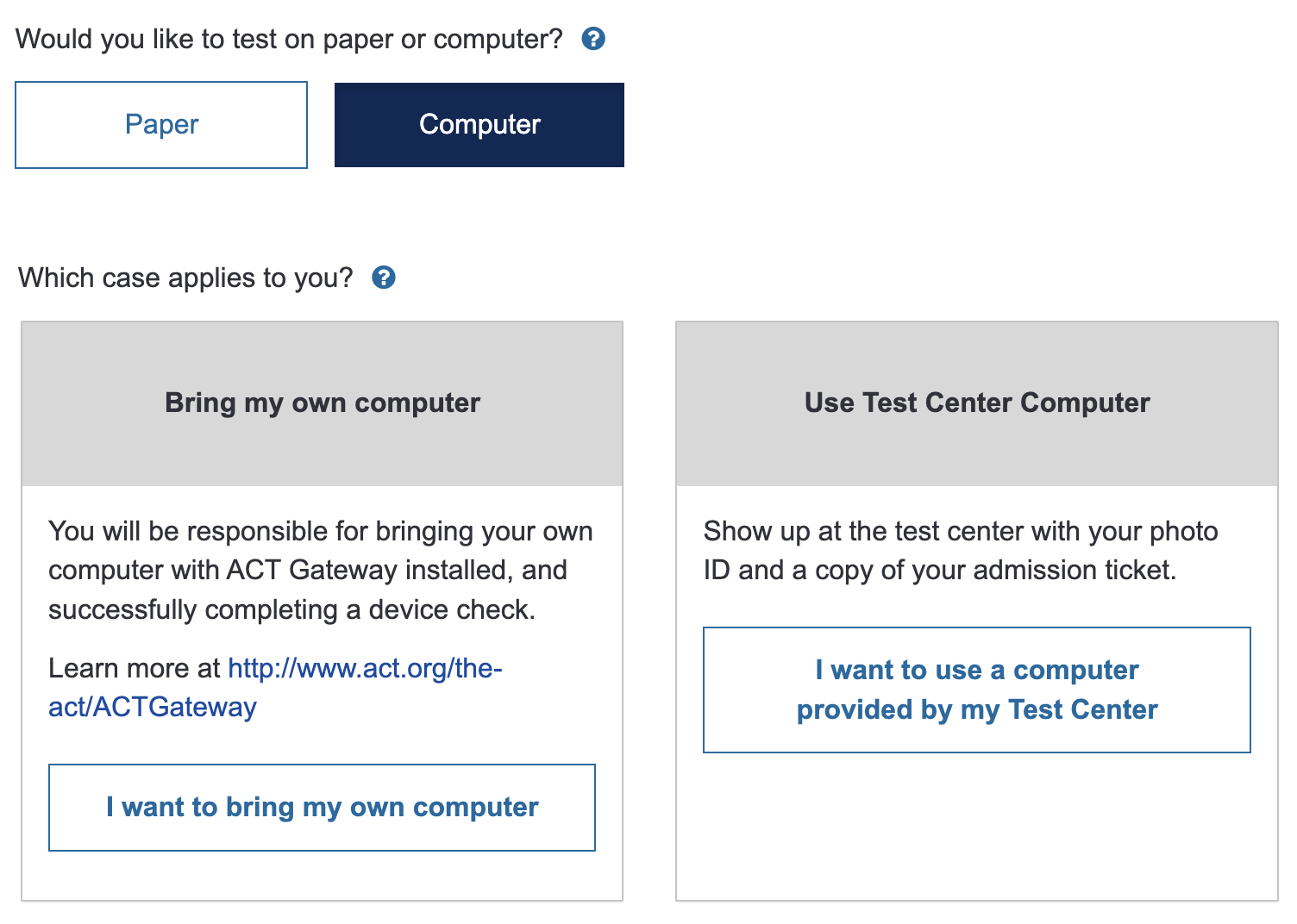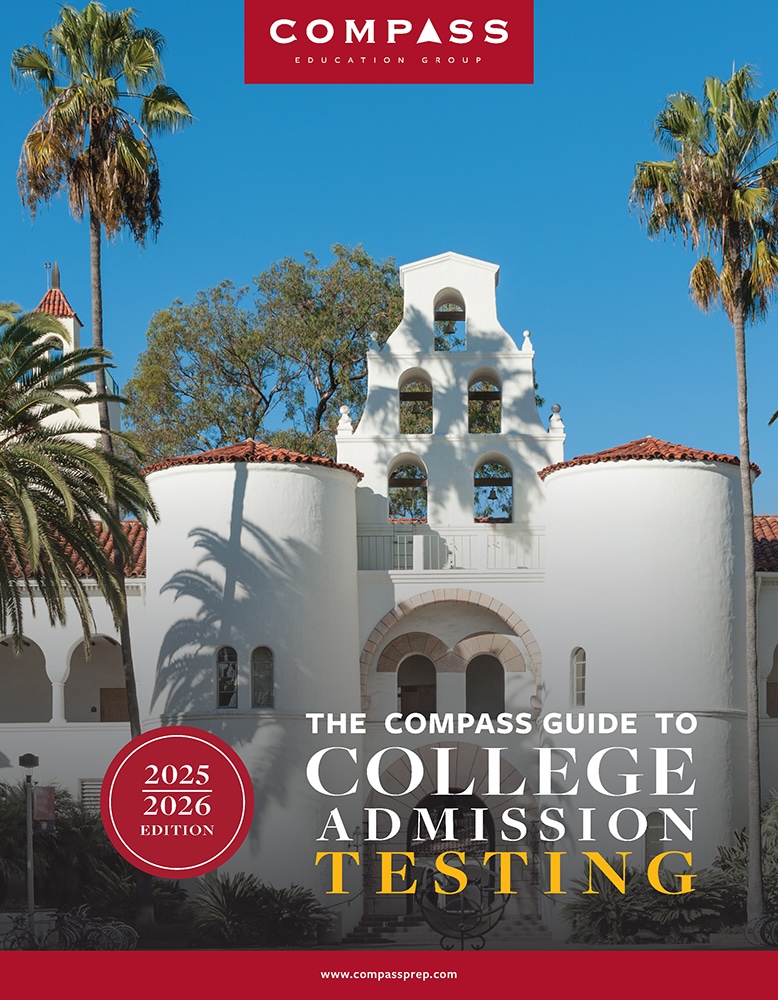ACT’s pitch to students is flexibility. But that flexibility raises many questions: Should you test on paper or computer? If computer, should you bring your own? Should you take the science test? What about the writing test? There are a dozen different variations of the test-taking experience!
Compass has been helping families navigate questions like these for decades. This post walks you through the registration process and Compass’ recommendations for you to have your best testing experience.
Note: Compass cannot register clients for the ACT. You must follow the steps below on your own even if you are enrolled in a class or tutoring with Compass.
Step 1: REGISTER OR SIGN IN TO YOUR ACCOUNT
Go to my.act.org
Create a MyACT account if you do not already have one. Log in if you do.
Have a photo and payment ready. Don’t worry about grades and courses.

Step 2: Domestic or International
Unless you’re testing outside of the U.S., select “In the U.S.”

Step 3: Accommodations
If you do not need accommodations, select “No, None Needed”. If you have already been approved for accommodations or have previously taken the ACT Test with accommodations, select “Yes, Accoms/Supports Needed.”
If you have not yet been approved for ACT accommodations, learn about the process here.

Accommodations are not affected by the change of the ACT from the classic format to the new, enhanced format.
Step 4: Paper or Computer
Compass recommends that you take the test on paper.

Why take the official test on paper?
- The paper and computer versions of the test are the same, so there is no content or length advantage to taking it on a computer.
- It is easier to underline in a test booklet than to highlight on a screen.
- Technical glitches are more likely to occur with a computer test than with a paper booklet.
- Seat availability is higher for paper in most locations. Even if you are able to register for computer testing on one date, you may not find availability if you retest.
What if I really want to take the test on a computer?
Some students have good reasons for preferring a computer-based test. In those cases, you will have the option to either bring your own computer or use a test center computer.
It is much harder for testing sites to offer computers, so you will likely find more seats available if you bring your own computer. You may want to check availability for both options – test center computer and your own computer – because not every site offers both. If you bring your own computer, the site’s technical coordinator may have a harder time troubleshooting technical issues.

Compass recommends that you practice on whatever device you’ll use on test day, so bringing your own computer is the better option. Just make sure it’s fully charged and you bring a power adapter.
You will need to download the ACT Gateway app in advance of test day. The ACT Gateway application is currently supported on Windows, Chromebook, and Macbook computers. Tablets and iPads are not yet supported.
Step 5: Science
Compass recommends that you include the optional science section. Most colleges will either consider the science score or have not indicated a preference or policy. For more information about colleges’ policies on ACT science, click here.

You can select No Science if you are absolutely certain that your college list is final and none of the colleges on your list will consider the science score.
Step 6: Writing
You do not need to take the writing test. Colleges do not use it as part of their admissions process. It continues to exist for state testing contracts.

Step 7: Select Your Location
Once you’ve made your selections, ACT provides you with a list of testing centers organized by test date. Those without remaining seats are disabled; click “Show farther sites” for a more comprehensive list for a given date.
If you aren’t finding what you want, try returning to earlier decisions and changing your inputs. For instance, paper or computer testing may be available at different sites. If the paper site is filled, you may find a nearby seat at a computer-based testing center.
Optional: My Answer Key (October, April, June)
When registering for the October, April, or June national Saturday test administration, you have the option to add My Answer Key (formerly, Test Information Release), which includes a copy of the test booklet, key, your answers, and the conversion tables (scales) for $34. This is a useful way to review in detail your performance.

Taking a practice test with Compass can also give you all of this information, plus additional advanced analytics.
Step 8: Score Sends
ACT lets you send your scores to four schools as part of your registration. You can name those schools up to 24 hours after you complete the test for no additional fee. These free reports will only include results for that test date. There is a fee for Superscore reports.
You do not have to select schools during registration. You can wait until you have a better understanding of what you want to send to whom.
Self-Reported Scores
An increasing number of colleges allow students to skip sending an official score report until after admission. Students can report results directly on the Common App or other online application. This allows you to report exactly what you want when you want. Learn more about self-reported scores here.
Superscore Report
Instead of sending individual test scores, you can send a Superscore report for a fee. A “superscore” creates a Composite score from a student’s best performances on English, math, and reading across all test dates. About 75% of the competitive colleges tracked by Compass choose to superscore the ACT when evaluating applicants’ test results. The ACT Superscore report, despite its name, sends more than just your superscore. It includes all the scores from test dates that make up your superscore. It also includes your best single-date performance.
If you aren’t sure about your school list or if you’re planning to test more than once, you may want to skip sending scores at the registration stage.
Step 9: Make a Plan to Prepare for the ACT
If you haven’t already done so, take a practice test to get a sense of your baseline ACT score. The score report will give you an outline of your strengths and weaknesses.
Compass offers private tutoring for students preparing for the ACT. A Compass Director can help to customize a tutoring program to meet your needs. Click here to schedule an appointment.
Small group classes are also an excellent way to prepare for the ACT. Click here for our upcoming ACT classes.

